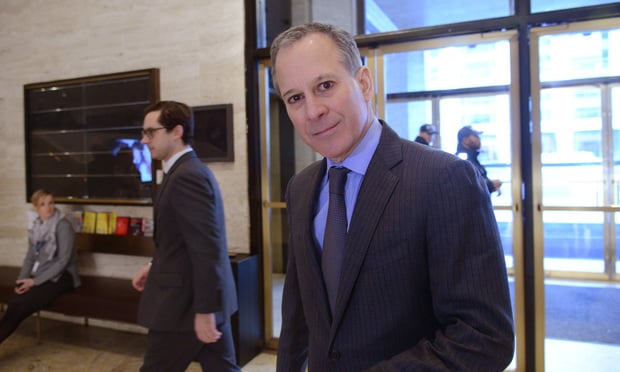With Schneiderman's Downfall, #MeToo Grips the Legal World
New York Attorney General Eric Schneiderman's resignation adds another name to the list of prominent male figures in the legal world who have fallen from grace in the wake of #MeToo.
May 08, 2018 at 05:41 PM
5 minute read
 Eric Schneiderman is one of several prominent men in the legal world to step down in the wake of sexual misconduct allegations.
Eric Schneiderman is one of several prominent men in the legal world to step down in the wake of sexual misconduct allegations.
When the #MeToo movement began last year following allegations of rampant sexual misconduct against former Hollywood heavyweight Harvey Weinstein, many observers wondered if or when similar allegations would start to strike at prominent lawyers and judges and make even the legal profession susceptible to the growing power of the movement.
They can stop wondering.
The career of New York Attorney General Eric Schneiderman ended abruptly this week after an in-depth article in The New Yorker detailed allegations that he had assaulted four women with whom the former state attorney general had romantic relationships or encounters.
But Schneiderman is not the first in the legal profession to fall at a time when #MeToo appears to have taken hold. Others, too, have stepped down after allegations of sex-tinged misconduct. The legal industry, it appears, is no longer immune to the force and weight of the #MeToo movement.
“We are seeing a sea change that is marked by a willingness to speak out, and a lessened fear that silence is the only option,” said Lauren Stiller Rikleen, a legal industry consultant focused on gender and generational issues who heads the Rikleen Institute for Strategic Leadership. ”We will definitely see a continuation of people choosing to come forward.”
Schneiderman announced Monday night that he would resign effective at the close of business on Tuesday. Before issuing his statement, he acknowledged involvement with the women but said he had “engaged in role-playing and other consensual sexual activity.” The women, who allege that Schneiderman choked or hit them, denied that the actions came as part of consensual sexual play.
Schneiderman had built a reputation as a top law enforcement figure and drew praise as a champion for women who doggedly investigated sexual harassment allegations against other men.
But months before Schneiderman's stunning downfall, the momentum of the #MeToo movement struck another prominent member of the legal profession: a previously well-regarded federal appeals court judge, Alex Kozinski.
Kozinski, a former judge at the U.S. Court of Appeals for the Ninth Circuit, retired in December after a number of women accused him of misconduct. The women, many of them former clerks of Kozinski's or another Ninth Circuit judge, said the jurist subjected them to overtly sexual comments or showed them pornography.
Then came William Voge, the former head of one of the world's largest and most profitable law firms. In March, former Latham & Watkins chairman Voge left his perch after exchanging inappropriate “communications of a sexual nature” with a woman outside the firm, according to a statement Latham released at the time.
While different circumstances precipitated their departures from prominent legal positions, the allegations against all three men became public in the wake of the #MeToo movement, which has created a heightened awareness of gender inequality and sexual harassment.
Domestic violence, sexual harassment, and sexual assault are not new, observers say. But the insistent demands of women in the #MeToo movement have emboldened women to come forward despite fear and threats. That they are now being heard and believed, with real consequences, is what is new.
Rikleen cautioned, however, that in the legal industry, significant obstacles often keep harassment and misconduct allegations out of public view. Among other concerns, she said, are someone might still keep quiet based on fears of retribution, losing a job or losing influence within a law firm.
She also noted that in many instances, sexual harassment claims are covered under law firm partnership agreements or other employment contracts, which might also make victims hesitant to step forward.
Rikleen cited recent news reports about mandatory arbitration agreements that some firms required their young lawyers to sign, diverting potential claims of sexual harassment into a private proceeding rather than a public court case. Munger, Tolles & Olson took heat for having summer associates sign such agreements.
“Those are pretty chilling documents at this point in time,” Rikleen said. “The institutional hurdles are still pretty steep.”
But in a sign that the public has grown less tolerant of such behavior, Munger Tolles did a quick about-face after a Harvard Law School lecturer called attention to the employment pacts. At least one other firm, Orrick, Herrington & Sutcliffe, also abandoned its use of arbitration agreements in the wake of the Munger Tolles debacle.
And even with the fear of retribution, losing a job or such obstacles as arbitration agreements, the revelations about Schneiderman and others can be viewed as a sign of change, Rikleen said. They indicate that at least some women in the orbit of powerful legal figures have become emboldened to step forward if they've been victimized.
“For so long, victims have felt that silence is the only alternative,” she said. “Now there's hope that speaking up may be another alternative.”
This content has been archived. It is available through our partners, LexisNexis® and Bloomberg Law.
To view this content, please continue to their sites.
Not a Lexis Subscriber?
Subscribe Now
Not a Bloomberg Law Subscriber?
Subscribe Now
NOT FOR REPRINT
© 2025 ALM Global, LLC, All Rights Reserved. Request academic re-use from www.copyright.com. All other uses, submit a request to [email protected]. For more information visit Asset & Logo Licensing.
You Might Like
View All
'Ridiculously Busy': Several Law Firms Position Themselves as Go-To Experts on Trump’s Executive Orders
5 minute read
Why U.S. Big Law Was Mostly Sidelined in Asian IPOs in New York Last Year

Trump RTO Mandates Won’t Disrupt Big Law Policies—But Client Expectations Might
6 minute read
Trump's RTO Mandate May Have Some Gov't Lawyers Polishing Their Resumes
5 minute readTrending Stories
- 1No Two Wildfires Alike: Lawyers Take Different Legal Strategies in California
- 2Poop-Themed Dog Toy OK as Parody, but Still Tarnished Jack Daniel’s Brand, Court Says
- 3Meet the New President of NY's Association of Trial Court Jurists
- 4Lawyers' Phones Are Ringing: What Should Employers Do If ICE Raids Their Business?
- 5Freshfields Hires Ex-SEC Corporate Finance Director in Silicon Valley
Who Got The Work
J. Brugh Lower of Gibbons has entered an appearance for industrial equipment supplier Devco Corporation in a pending trademark infringement lawsuit. The suit, accusing the defendant of selling knock-off Graco products, was filed Dec. 18 in New Jersey District Court by Rivkin Radler on behalf of Graco Inc. and Graco Minnesota. The case, assigned to U.S. District Judge Zahid N. Quraishi, is 3:24-cv-11294, Graco Inc. et al v. Devco Corporation.
Who Got The Work
Rebecca Maller-Stein and Kent A. Yalowitz of Arnold & Porter Kaye Scholer have entered their appearances for Hanaco Venture Capital and its executives, Lior Prosor and David Frankel, in a pending securities lawsuit. The action, filed on Dec. 24 in New York Southern District Court by Zell, Aron & Co. on behalf of Goldeneye Advisors, accuses the defendants of negligently and fraudulently managing the plaintiff's $1 million investment. The case, assigned to U.S. District Judge Vernon S. Broderick, is 1:24-cv-09918, Goldeneye Advisors, LLC v. Hanaco Venture Capital, Ltd. et al.
Who Got The Work
Attorneys from A&O Shearman has stepped in as defense counsel for Toronto-Dominion Bank and other defendants in a pending securities class action. The suit, filed Dec. 11 in New York Southern District Court by Bleichmar Fonti & Auld, accuses the defendants of concealing the bank's 'pervasive' deficiencies in regards to its compliance with the Bank Secrecy Act and the quality of its anti-money laundering controls. The case, assigned to U.S. District Judge Arun Subramanian, is 1:24-cv-09445, Gonzalez v. The Toronto-Dominion Bank et al.
Who Got The Work
Crown Castle International, a Pennsylvania company providing shared communications infrastructure, has turned to Luke D. Wolf of Gordon Rees Scully Mansukhani to fend off a pending breach-of-contract lawsuit. The court action, filed Nov. 25 in Michigan Eastern District Court by Hooper Hathaway PC on behalf of The Town Residences LLC, accuses Crown Castle of failing to transfer approximately $30,000 in utility payments from T-Mobile in breach of a roof-top lease and assignment agreement. The case, assigned to U.S. District Judge Susan K. Declercq, is 2:24-cv-13131, The Town Residences LLC v. T-Mobile US, Inc. et al.
Who Got The Work
Wilfred P. Coronato and Daniel M. Schwartz of McCarter & English have stepped in as defense counsel to Electrolux Home Products Inc. in a pending product liability lawsuit. The court action, filed Nov. 26 in New York Eastern District Court by Poulos Lopiccolo PC and Nagel Rice LLP on behalf of David Stern, alleges that the defendant's refrigerators’ drawers and shelving repeatedly break and fall apart within months after purchase. The case, assigned to U.S. District Judge Joan M. Azrack, is 2:24-cv-08204, Stern v. Electrolux Home Products, Inc.
Featured Firms
Law Offices of Gary Martin Hays & Associates, P.C.
(470) 294-1674
Law Offices of Mark E. Salomone
(857) 444-6468
Smith & Hassler
(713) 739-1250










